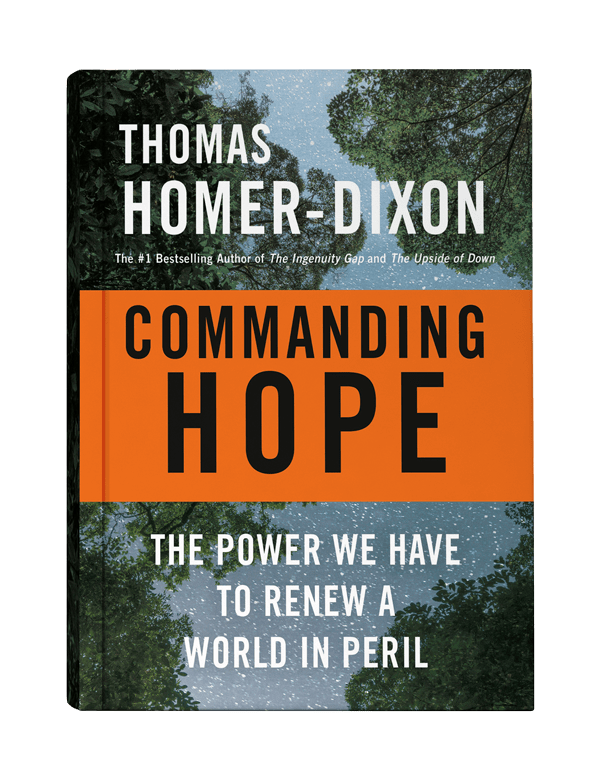Hope has seen better days. But Thomas Homer-Dixon has written a book for ‘those who choose to fight’
Toronto Star
This essay is adapted from Thomas Homer-Dixon’s new book, “Commanding Hope: The Power We Have to Renew a World in Peril” (Knopf Canada). Homer-Dixon holds a University Research Chair at the University of Waterloo and is executive director of the Cascade Institute at Royal Roads University. He’s also an award-winning author, focusing on threats to global security.
The rising risk of nuclear war. Donald Trump’s 2016 election. Vast clouds of wildfire smoke. A global pandemic.
These four things seem like apples and oranges, but they share one key similarity: each signals that something is going awry in the story of human progress.
Of course, that story is enormously complex and can be read in many ways. By one reading, our species has made stunning advances since, say, the middle of last century. As authors such as Steven Pinker note, rates of wretched poverty, infectious disease, and mass violence have all plummeted around the world in recent decades. And when we look ahead, exciting technological advances in genetic medicine, robotics, artificial intelligence and the like seem about to bring huge improvements to (at least some) people’s lives.
But by another reading, humanity is no longer moving towards a future anymore that will allow our communities locally, nationally and globally to flourish together. If we’re moving anywhere at all, we seem to be sliding down a slippery slope towards a treacherous place, with unreason, self-righteous anger and racism greasing our shared descent.
Nations have abjectly failed to rid the world of nuclear weapons once and for all. The great powers (and a few smaller ones, too) still deploy these hideous machines by the thousands, many on high alert, despite countless mass protests down through the years, as well as advocacy campaigns, desperate pleas by scientists and earnest commitments by statesmen.
Worse, after several decades when treaties and détente between nuclear-armed countries did genuinely reduce the risk of nuclear war, it’s now escalating again, as the United States pulls out of arms-control treaties, while leaders of the United States, Russia, North Korea, India and Pakistan brag about using nukes to annihilate their enemies.
Across other fronts, too, threats to our collective well-being are multiplying.
We see economic, political and social distress soaring within many societies from widening inequalities of wealth and opportunity, large disparities in human population growth between the world’s rich and poor regions, surging flows of distressed migrants and refugees inside countries and across international borders, and cascading effects of contagious disease — so far in 2020, hundreds of millions of jobs lost and, countless companies bankrupt, and rising hunger and civil unrest in poor countries far and wide.
We’re seeing, as well, worsening instabilities in key natural systems, particularly Earth’s climate. As humanity’s staggering resource consumption and pollution output push these natural systems out of equilibrium, coral reefs die; populations of vertebrates, birds and insects, including pollinators, plummet; the Arctic ice cap shrinks; extraordinarily powerful storms ravage the world’s coastlines; droughts bake its croplands; and vicious fires rip through its forests.
We might consciously notice some of these threats — as when news of cross-border migrations or economic dislocations directly affects us, wildfire smoke blots out the sky overhead, or a new coronavirus locks down our community, costs us our jobs and destroys our savings — but most of us are only subliminally aware of the other threats, like growing economic inequality and disappearing pollinators.
Still, even this subliminal awareness can powerfully affect our general mood by creating an intuition that things are going wrong — that our lives are ever more insecure, that other people and groups are getting ahead of us, and, perhaps most alarmingly, that our children are likely to be worse off than us when they grow up.
That intuition is reinforced by an apparently nonstop stream of events — headlined in our news feeds — that not long ago would have seemed, once again, right out of a dystopian fantasy. We see video clips of young men driving trucks at high speed into families strolling in city streets; an accountant firing automatic weapons from a hotel tower into a crowd at a music festival; professed Nazis marching shamelessly in public spaces; and war combatants in Syria deliberately targeting hospitals with missiles and children — children! — with poison gas.
>As the feeling that things are going wrong becomes palpable, people become more likely to perceive the world as fraught with uncertainty and bounded by constraint, and they’re more likely to think that danger and awful surprise lurk just beyond the edge of their day-to-day reality.
And as they become hesitant and anxious — as their faith in progress shrinks — they become more inclined to talk to each other in the emotional cadences of doubt and fear, and the stories they tell about their future become muted and drained of excitement and positive possibility. (The French word inquiétude — a disturbing emotional state caused by fear, worry and uncertainty — captures this feeling well.)
Mood matters. When hundreds of millions if not billions of people start to feel these ways, the basic dynamic of humanity’s politics can shift abruptly — as we saw, for instance, during the Great Depression and its aftermath.
Many people, scared and resentful, turn away from leaders who seem soft, incompetent, beholden to powerful elite interests and unable to come to grips with the problems affecting them, and turn towards those who are hard, angry and decisive (yet often equally or more beholden to elite interests) and who declare they’ll protect families, communities and nations with whatever means necessary. Authoritarianism gains ground.
Autocrats have historically played on their followers’ social and economic insecurities and on fears of “them” to curtail basic political and civil rights, suffocate free speech and assembly, and jail or sometimes assassinate opponents and journalists. Today, even in some of the world’s oldest liberal democracies like the United States and England, populist politicians and their enablers are stoking grievances towards outsiders; attacking the free press, basic democratic norms of tolerance and forbearance, and the rule of law; and denying well-established scientific fact.
This shift is fraying the fabric of norms, institutions and laws — the liberal international order — that people worldwide have laboriously woven since the middle of the 19th century in innovative answer to world wars, genocides, financial crises, famines, pandemics and environmental calamities.
It ranges from the Geneva Protocol banning the use of poison gas to the UN Convention on the Rights of the Child, the World Health Organization and the Paris Agreement on climate change. Threadbare even at its best, this fabric is now being shredded by neglect, underfunding, the outright hostility of many nations and, most importantly, the impunity enjoyed by those who regularly violate its makeshift moral framework.
What does all of this portend? Are we at a point where the curve of our collective well-being begins to bend sharply downwards? It appears so: when we dispassionately weigh the evidence, the negative trends I’ve just described seem to be starting to overwhelm the positive ones highlighted by Pinker, Gregg Easterbrook, Matt Ridley, and like-minded commentators. This new downward trend isn’t inexorable, though … at least not yet. There are still many things we can do to bend our curve upwards again.
And by “we” here, I mean not just North Americans or members of the richer western societies, but all people, everywhere. The entire human species is involved today; our fates are too intertwined on Earth for it to be otherwise, as the COVID-19 pandemic’s explosive propagation through our tightly connected global networks has made abundantly clear.
Humanity can’t and won’t address its urgent challenges unless enough of us from a broad range of cultures and societies recognize ourselves as one group, with a shared sense of identity, facing these challenges and developing solutions together.
At this crucial moment in humanity’s history, I argue, three changes are essential to keep us from descending into intractable, savage violence.
First, we need individually to better understand how and why we see the world the way we do and what makes other people’s views sometimes so different from ours. Second, instead of passively accepting a dystopian image of what will come tomorrow, we need to actively create together from our diverse perspectives a shared story of a positive future — including a shared identity as “we” — that will help us address our common problems and thrive. And, finally, we need to fully mobilize our extraordinary human agency to produce that future.
Each of these changes requires that we have hope. Unfortunately, though, hope has seen better days.
Barely more than a decade ago, Barack Obama could speak unabashedly of the “audacity of hope” in his presidential campaign, and his idea was a powerfully motivating psychological and social force in the world. And over the last 15 years, eminent thinkers and social scientists have called for “radical hope,” “active hope” and “intrinsic hope.” But despite these vital efforts to rejuvenate the idea, many of us have come to regard hope with disdain — as a state of mind that’s naive and irresolute at best, delusional at worst.
In Dante’s 14th-century epic poem “The Divine Comedy,” the entrance to Hell famously carries the inscription: “Abandon all hope, ye who enter here.” The phrase has become watered down over time, almost trite. But facing a future that promises to be hell for countless people, our task in the 21st century is to rediscover the power of the uniquely human ability to hope — an ability to envision and strive toward a positive future that’s an alternative to whatever challenging or even unbearable present we’re living in.
I propose a way of mobilizing hope’s immense psychological power, as people have done in times of great stress before and can do again. What I call “commanding hope” is grounded in historical and scientific knowledge of how hope works at every level — in our lives as individual human beings and in our societies too. Today, confronting challenges so large that all too often we feel unable to move, we need it more than ever.
There are no guarantees of success. The perils are real, and the chances we’ll prevail may be small. But we face a choice between denying reality, running from the crisis, or facing that crisis head on to fight for a far better future.
I’ve written this book for all of us — community activists, parents and grandparents, students and teachers, business and religious leaders, farmers and builders, scientists and engineers, nurses and doctors, restaurant and shop owners and artists, politicians and voters — all of us who choose to fight.

